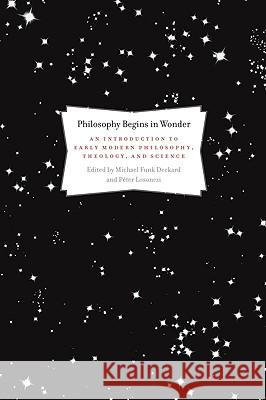Philosophy Begins in Wonder » książka
Philosophy Begins in Wonder
ISBN-13: 9781556357824 / Angielski / Miękka / 2010 / 390 str.
Philosophy Begins in Wonder
ISBN-13: 9781556357824 / Angielski / Miękka / 2010 / 390 str.
(netto: 198,12 VAT: 5%)
Najniższa cena z 30 dni: 205,72
ok. 16-18 dni roboczych.
Darmowa dostawa!
Philosophy begins with wonder, according to Plato and Aristotle. Yet Plato and Aristotle did not expand a great deal on what precisely wonder is. Does this fact alone not raise curiosity in us as to why this passion or concept is important? What is wonder's role in science, philosophy, or theology except to end thinking or theorizing as soon as one begins? The primary purpose of this book is to show how seventeenth- and eighteenth-century developments in natural theology, metaphysics, epistemology, ethics, aesthetics, and the philosophy of science resulted in a complex history of the passion of wonder-a history in which the elements of continuation, criticism, and reformulation are equally present. Philosophy Begins in Wonder provides the first historical overview of wonder and changes the way we see early modern Europe. It is intended for readers who are curious-who wonder-about how modern philosophy and science were born. The book is for scholars and educated readers alike. ""Some very famous scholars have claimed that in the Enlightenment and Scientific worldview there is no place for wonder. Michael Funk Deckard and Peter Losonczi are to be congratulated for assembling such a fine, focused collection that, among its many virtues, dispels the myth of the disappearance of wonder at the dawn of Modernity. Plato and Aristotle agreed that philosophy begins in wonder, but famously disagreed about where it ends. Plato would not be surprised that even in knowing ages, wonder can be truth's consequence."" --Eric Schliesser, Leiden University ""This rich and provocative collection of essays could bear fruit in a dozen or more books, each of them already here in gist. May it be so."" --John Wilson, Editor, Books & Culture ""(This is) an illuminating collection of essays which traces the religious, scientific, and philosophical history of wonder, and which will be a much-needed and long-awaited aid to all those interested in exploring this important yet understudied topic."" --Sophia Vasalou, European College of Liberal Arts in Berlin Michael Funk Deckard is Assistant Professor of Philosophy at Lenoir-Rhyne College in North Carolina. He has taught History of Ideas, Philosophy, and Ethics at the Catholic University of Leuven (Belgium), North Central College (Naperville, Illinois) and Wheaton College (Wheaton, Illinois). He also has published articles and reviews in journals such as The Heythrop Journal; British Journal of Aesthetics; Eighteenth-Century Thought; Bijdragen: International Journal in Philosophy and Theology; Philosophy in Review; Tijdschrift voor Filosofie, and Verbum: Analecta Neolatina. Peter Losonczi is an associate professor at the Department of Philosophy, University of West Hungary. His publications include essays and books, among others the co-edited volumes Reflecting Diversity (LIT, Wien-Berlin-London, 2007), Religio Academici (Akademiai/Wolters Kluwer, Budapest, 2009) and From Political Theory to Political Theology (Continuum, London-New York, forthcoming 2010).
Philosophy begins with wonder, according to Plato and Aristotle. Yet Plato and Aristotle did not expand a great deal on what precisely wonder is. Does this fact alone not raise curiosity in us as to why this passion or concept is important? What is wonders role in science, philosophy, or theology except to end thinking or theorizing as soon as one begins? The primary purpose of this book is to show how seventeenth- and eighteenth-century developments in natural theology, metaphysics, epistemology, ethics, aesthetics, and the philosophy of science resulted in a complex history of the passion of wonder-a history in which the elements of continuation, criticism, and reformulation are equally present. Philosophy Begins in Wonder provides the first historical overview of wonder and changes the way we see early modern Europe. It is intended for readers who are curious-who wonder-about how modern philosophy and science were born. The book is for scholars and educated readers alike.""Some very famous scholars have claimed that in the Enlightenment and Scientific worldview there is no place for wonder. Michael Funk Deckard and Peter Losonczi are to be congratulated for assembling such a fine, focused collection that, among its many virtues, dispels the myth of the disappearance of wonder at the dawn of Modernity. Plato and Aristotle agreed that philosophy begins in wonder, but famously disagreed about where it ends. Plato would not be surprised that even in knowing ages, wonder can be truths consequence.""--Eric Schliesser, Leiden University""This rich and provocative collection of essays could bear fruit in a dozen or more books, each of them already here in gist. May it be so.""--John Wilson, Editor, Books & Culture""(This is) an illuminating collection of essays which traces the religious, scientific, and philosophical history of wonder, and which will be a much-needed and long-awaited aid to all those interested in exploring this important yet understudied topic.""--Sophia Vasalou, European College of Liberal Arts in BerlinMichael Funk Deckard is Assistant Professor of Philosophy at Lenoir-Rhyne College in North Carolina. He has taught History of Ideas, Philosophy, and Ethics at the Catholic University of Leuven (Belgium), North Central College (Naperville, Illinois) and Wheaton College (Wheaton, Illinois). He also has published articles and reviews in journals such as The Heythrop Journal; British Journal of Aesthetics; Eighteenth-Century Thought; Bijdragen: International Journal in Philosophy and Theology; Philosophy in Review; Tijdschrift voor Filosofie, and Verbum: Analecta Neolatina. Peter Losonczi is an associate professor at the Department of Philosophy, University of West Hungary. His publications include essays and books, among others the co-edited volumes Reflecting Diversity (LIT, Wien-Berlin-London, 2007), Religio Academici (Akademiai/Wolters Kluwer, Budapest, 2009) and From Political Theory to Political Theology (Continuum, London-New York, forthcoming 2010).











